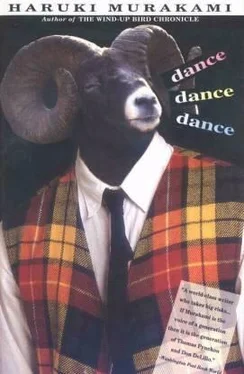The problem was that I hadn't wanted her, really wanted her. I'd liked her, liked being with her. She brought me back to gentle feelings. But what it came down to was, I never felt a need for her .Not three days after she got out of my life, the realization hit home. That ultimately, all the time I'd been next to her, I might as well have been on the moon. The whole while I'd felt her breasts against me, I'd really wanted something else.
It took four years to get my life back on steady ground. I carefully dispatched each piece of work that came my way, and people came to feel they could depend on me. Not many, but a few, even became friendly. Though, it goes without saying, that wasn't enough. Not enough at all. Here I'd spent all this time trying to get up to speed, and I was back to where I started.
Okay, I thought, age thirty-four, square one. What do you do now? I didn't have to think much about that one. I knew already. The answer had been floating over my head like a dark, dense cloud. All I had to do was take action, instead of putting it off and putting it off. / had to go to the Dolphin Hotel . That's where it all started.
I also had to find her . The woman who'd first guided me to the Dolphin Hotel, she who'd been a high-class call girl in her own covert world of night. (Under astonishing circumstances, I was to learn this nameless woman's name sometime later, but, for reasons of convenience, unorthodox as it will seem, I'll tell it to you now. Pardon me, please. It was Kiki.) Yes, Kiki held the key. I had to call her back to me. To a life with me she'd left never to return. Was it possible? Who knew, but I had to try. From then would begin a new cycle.
I packed my bags, did double time to finish up outstanding work, then canceled all the jobs I'd penciled in for the next month. I said I was leaving Tokyo on family business. A couple of editors made noises, but what could they do? I'd never let them down before, and besides I was giving them plenty of advance notice to find other ways and means. In the end, it was fine. I'd be back in a month, I told them.
Then I took a flight to Hokkaido. This was the beginning of March 1983.
Of course, the family business wasn't over in anything near a month.
I booked a taxi for two days, and the photographer and I raced around Hakodate in the snow checking out eateries in the city.
I'm good at researching, very systematic, very efficient. The most important thing about this sort of job is to do your homework and set up a schedule. That's the key. When it comes to gathering materials beforehand, you can't beat organizations that compile information for people in the field. Become a member and pay your dues; they'll look up almost anything for you. So if by chance you're researching eating places in Hakodate, they can dig up quite a bit. They use mainframe computer retrieval, arrange the facts in file format, print out hard copy, even deliver to your doorstep. Granted, it's not cheap, but plenty worth the time it buys.
In addition to that, I do a little walking for information myself. There are reading rooms specializing in travel materials, libraries that collect local newspapers and regional publications. From all of these sources, I pick out the promising spots, then call them up to check their business hours. This much done, I've saved a lot of trouble on site. Then I draw lines in a notebook and plan out each day's itinerary. I look at maps and mark in the routes we'll travel. Trying to reduce uncertainties to a minimum.
Once we arrive in Hakodate, the photographer and I go around to the restaurants in order. There are about thirty. We take a couple of bites—just enough to get the taste—then casually leave the rest of the meal uneaten. Refinements in consumption. We're still undercover at this stage, so no picture taking. Only after leaving the premises do the photographer and I discuss the food and evaluate it on a scale of one to ten. If it passes, it stays on the list; if not, it's out. We generally figure on dropping at least half. Taking a parallel tack, we also check the local papers for listings of places we've missed, selecting maybe five. We go to these too, and weed out the not-so-good. Then we've got our finalists. I call them up, give the name of the magazine, tell them we'd like to do a feature on them—text with photos. All that in two days. Nights, I stay in my hotel room, laying down the basic copy.
The next day, while the photographer does quick shots of the food and table settings, I talk to the restaurant owners. Saves on time. So we can call it a wrap in three days. True, there are those in our league who take even less time. But they don't do any research. They do a handful of the more well-known spots, cruise through without eating a thing, write brief comments. It's their business, not mine. If I may be perfectly frank, I doubt that many writers take as many pains as I do at this level of reportage. It's the kind of work that can break you if you're too serious about it, or you can kick back and do almost nothing. The worst of it is, whether you're earnest or you loaf, the difference will hardly show in the finished piece. On the surface. Only in the finer points can you find any hint of the distinction.
I'm not explaining this out of pride or anything.
I just wanted you to have a rough idea of the job, the sort of expendables I deal with.
On the third night, I finish writing.
The fourth day is left free, just in case.
But since the work has been completed and we don't have anything else in the tube, we rent a car and head off for a day of cross-country skiing. That evening, the two of us settle down to drinks over a nice, simmering hot pot. One day's relaxation. I turn over my manuscript to the photographer, and that's it. My job's done, the work's in someone else's hands.
But before turning in that evening, I rang up Sapporo directory assistance for the number of the Dolphin Hotel. I didn't have to wait long. I sat up in bed and sighed. Well, at least the Dolphin Hotel hadn't gone under. Relief, I guess. Because I wouldn't have been surprised if it had, a mysterious place like that. I took a deep breath, dialed the number —and someone answered immediately. As if they'd been just waiting for it to ring. So immediately, in fact, I was taken aback.
«Hello, Dolphin Hotel!» went a cheerful voice.
It was a young woman. A woman? What's going on? I don't remember a woman being there.
It didn't figure, so I checked if the address was the same. Yes, it was exactly where the Dolphin Hotel I knew used to be. Maybe the hotel had hired someone new, the owner's niece or something. Nothing so odd about that. I told her I wanted to make a reservation.
«Thank you very much, sir,» she chirped. «Please wait a moment while I transfer you to our reservations desk.»
Our reservations desk ? Now I was really confused. I couldn't begin to digest that one. What the hell happened to the old joint?
«Sorry to keep you waiting. This is the reservations desk. How may I help you?» This time, a young man's voice. The brisk, friendly pitch of the professional hotel man. Curiouser and curiouser.
I asked for a single room for three nights. I gave him my name and my Tokyo phone number.
«Very well, sir. That's three nights, starting from tomorrow. Your single room will be waiting for you.»
I couldn't think of anything to say to that, so I thanked him and hung up, completely disoriented. Shouldn't I have asked for an explanation? Oh well, it'd all become clear once I got there. And anyway, I couldn't not go. I didn't have an alternative.
I asked the concierge to check the schedule for trains to Sapporo. After that, I got room service to send up a bottle of whiskey and some ice, and I stayed up watching a late-night movie on TV. A Clint Eastwood western. Clint didn't smile once, didn't sneer. I tried laughing at him, but he never broke his deadpan. The movie ended and I'd had my fill of whiskey, so I turned out the light and slept straight through the night. If I dreamed, I don't remember.
Читать дальше












